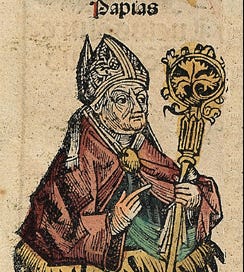Lessons to learn from Papias
The beginnings of Christianity are complicated, and the religion changed a lot over time.
In this post, I want to recount a few lessons that one can learn from the fragments of Papias. I will draw from the fragments of Papias as collected in Michael Holmes, The Apostolic Fathers: Greek Texts and English Translations (Baker Academic, 2007). These fragments are drawn from various sources, principally Eusebius’s Ecclesiastical History III and other works.
Papias was a bishop of Hierapolis who lived between 60–130 AD. He purportedly knew “John the Elder.” He wrote a work called Expositions of the Sayings of the Lord in five books.
The following passages are cited from Eusebius, Ecclesiastical History III.
There were no “canonical” gospels in Papias’s time. If there were gospel texts widely recognized as canonical in proto-catholic circles, then there would be no reason for Papias to prefer “a living and abiding voice” to “information from books.”
It’s also worth noting that Papias’s investigations were hardly scientific or neutral. He had an antecedent preference for his own conception of the “truth” and a bias against “those who have a great deal to say.”
Notice, too, that Papias does not mention Paul at all. Given that Paul had already died and written numerous letters by this point in history, having founded churches all throughout the Roman empire, one might get the impression that Papias has a bias against the apostle to the Gentiles.
Papias reported supposedly apostolic traditions which later generations of Christians found ridiculous. Eusebius, for example, says here that Papias was rather stupid for taking literally things that Eusebius, some few hundred years later, thought were clearly metaphorical.
The following citation is from Irenaeus, Against Heresies 5.33.3–4.
Papias thought that there would be a future time in which the righteous would enjoy physically impossible material prosperity. This will all take place in the future millennium.
Eusebius noted that Papias had misled Irenaeus and earlier authors into believing this nonsense. He instead believes that the apostles’ teaching must have been metaphorical.
The following comes from a text by Apollinaris of Laodicea.
Papias taught that Judas did not die by suicide. He was rather tremendously fat and smelled badly.
Likewise from Eusebius, Ecclesiastical History III we get the following tradition about written sources of the sayings of the Lord:
Papias had no knowledge of canonical gospels, nor of anything written by John or Luke. He only knows a collection of the Lord’s sayings and deeds of Jesus supposedly coming from Peter through Mark, and of an apparently obscure collection of Jesus’s sayings in Hebrew put together by Matthew.
It’s not clear why Papias would show a clear distrust of written sources (see above) while at the same time admitting knowledge of supposedly apostolic writings. Perhaps he did not think very highly of these works at all.
From Anastasius of Sinai:
Papias interpreted Genesis 1 allegorically as referring to Christ and the Church.
Here, then, a few conclusions we can draw from Papias, such as we have access to him.
There were no texts widely recognized as canonical in Papias’s time in the early part of the second century. If there were, there would be no reason for him to discount written sources as he does. He certainly does not know of four gospels, nor does he treat the supposed writings of Mark and Matthew as though they were canonical.
As evidenced in Holmes’s collection, Papias either shows no knowledge at all of Paul or else positively disregards him out of preference for persons whom he took to be the personal disciples of Jesus. In fact, later authors like John of Dara, On the Resurrection of Bodies 2.13 thought that Papias’s ideas of material enjoyments of food in the future kingdom were contrary to Paul’s more spiritual understanding of the kingdom.
Many of the supposedly apostolic traditions recounted by Papias on the basis of his investigations were considered strange by later generations of Christians, including his millenarianism and the idea that people would enjoy food in heaven. Eusebius calls Papias stupid and complains that he did not understand what the apostles meant to teach. Either Papias’s personal investigations were done haphazardly, or else the understanding of Christianity had changed considerably in the first three hundred years.












